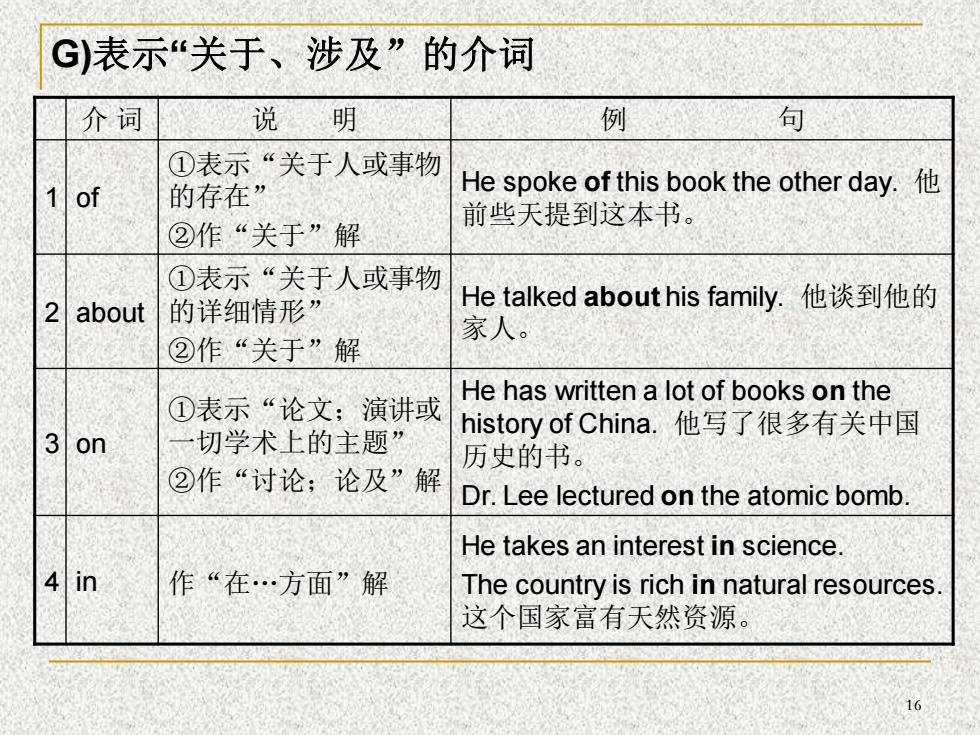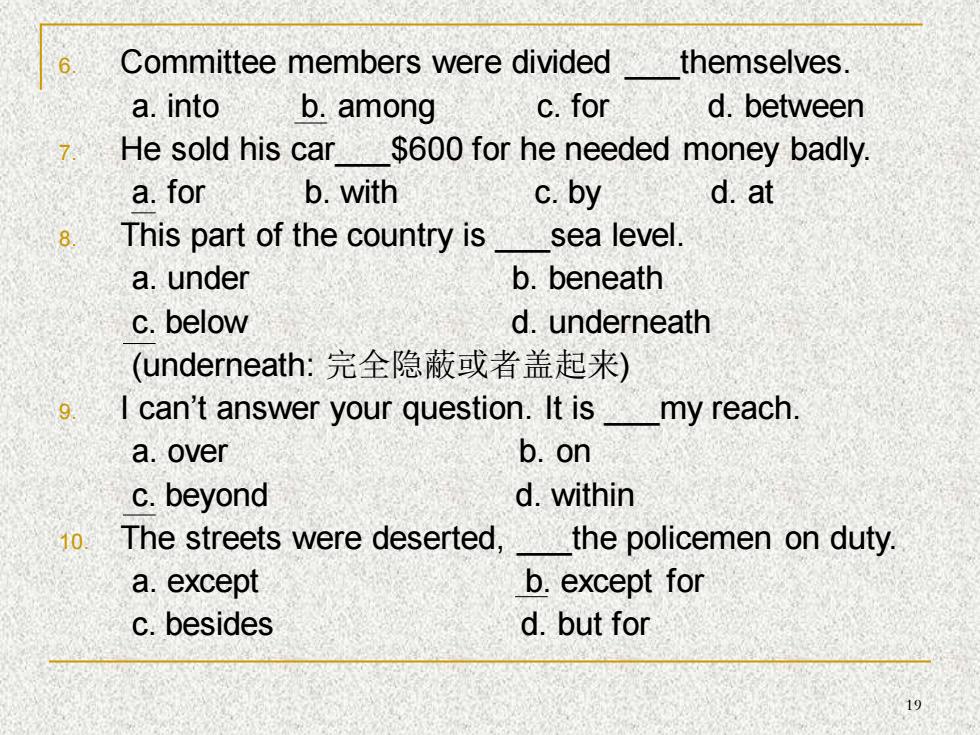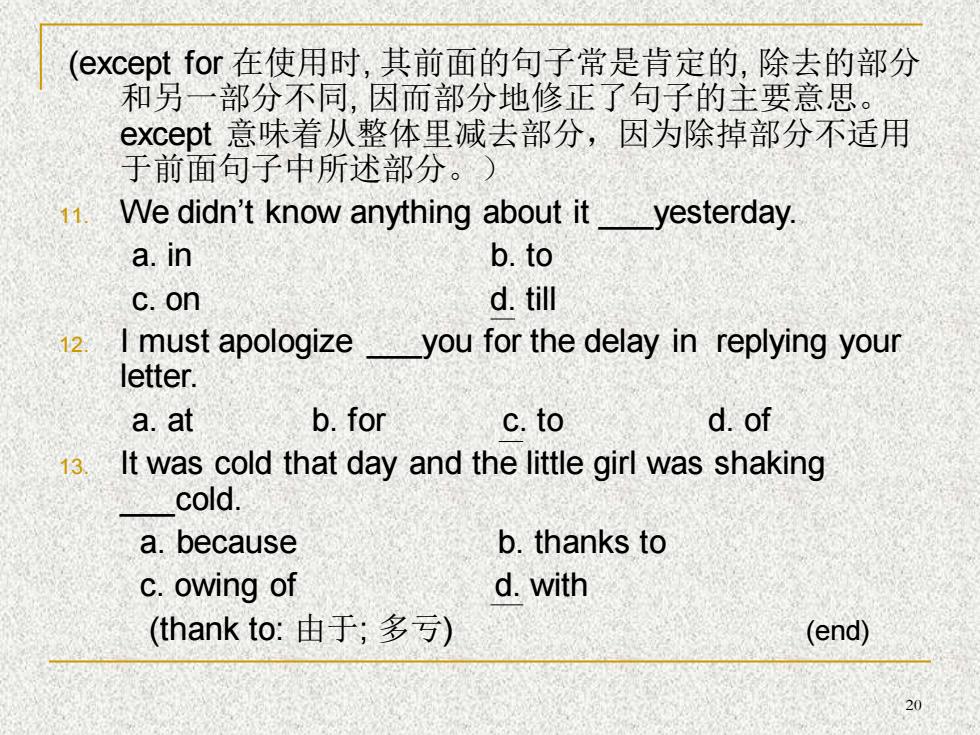
G)表示“关于、涉及”的介词 介词 说 明 例 句 ①表示“关于人或事物 1 of 的存在” He spoke of this book the other day. ②作“关于”解 前些天提到这本书。 ①表示“关于人或事物 2about 的详细情形” He talked about his family.他谈到他的 家人。 ②作“关于”解 He has written a lot of books on the ①表示“论文;演讲或 history of China.他写了很多有关中国 3on 切学术上的主题” 历史的书。 ②作“讨论;论及”解 Dr.Lee lectured on the atomic bomb He takes an interest in science. 4 in 作“在…方面”解 The country is rich in natural resources 这个国家富有天然资源
16 G)表示“关于、涉及”的介词 介 词 说 明 例 句 1 of ①表示“关于人或事物 的存在” ②作“关于”解 He spoke of this book the other day. 他 前些天提到这本书。 2 about ①表示“关于人或事物 的详细情形” ②作“关于”解 He talked about his family. 他谈到他的 家人。 3 on ①表示“论文;演讲或 一切学术上的主题” ②作“讨论;论及”解 He has written a lot of books on the history of China. 他写了很多有关中国 历史的书。 Dr. Lee lectured on the atomic bomb. 4 in 作“在…方面”解 He takes an interest in science. The country is rich in natural resources. 这个国家富有天然资源

Conclusion: So much for preposition.We discussed the classification of preposition,Collocation of prepositions with adjectives,verbs and nouns and then we talked about the usage of some commonly-used prepositions in this lecture. Now it is time for practice... Exercises: 1. When I was a schoolboy,my teacher often told us stories Lei Feng. a.on b.about c.for d.to (用于“关于”这一意义时注意与on的区别。About指泛谈, 描述性的;o指有系统地谈,论述性的。)
17 ◼ Conclusion: So much for preposition. We discussed the classification of preposition, Collocation of prepositions with adjectives, verbs and nouns, and then we talked about the usage of some commonly-used prepositions in this lecture. Now it is time for practice… Exercises: 1. When I was a schoolboy, my teacher often told us stories ___Lei Feng. a. on b. about c. for d. to (用于“关于”这一意义时注意与on 的区别。About指泛谈, 描述性的;on指有系统地谈,论述性的。)

2 There is a portrait of Chairman Mao the wall the blackboard. a.on /above b.over /on c.above over d.over /above 3. There was a grocery the street.So she went the street to the grocer's. a.on through b.in along c.across /across d.across /through (across:在..前面;横过;穿过) 4 saying goodbye to him,I didn't see him any longer. a.In b.Over c.Behind d.After 5. the wall the opposite side stand two cupboards a.On /against b.Against on c.Against /by d.Against/along
18 2. There is a portrait of Chairman Mao ___the wall___the blackboard. a. on /above b. over /on c. above / over d. over /above 3. There was a grocery___the street. So she went ___the street to the grocer’s. a. on / through b. in / along c. across /across d. across / through ( across:在…前面; 横过; 穿过) 4. ___saying goodbye to him, I didn’t see him any longer. a. In b. Over c. Behind d. After 5. ___the wall___the opposite side stand two cupboards. a. On / against b. Against / on c. Against / by d. Against / along

Committee members were divided themselves a.into b.among c.for d.between 7。 He sold his car $600 for he needed money badly. a.for b.with c.by d.at 8. This part of the country is sea level a.under b.beneath c.below d.underneath (underneath:完全隐蔽或者盖起来) I can't answer your question.It is my reach. a.over b.on c.beyond d.within 10 The streets were deserted,the policemen on duty a.except b.except for c.besides d.but for 10
19 6. Committee members were divided ___themselves. a. into b. among c. for d. between 7. He sold his car___$600 for he needed money badly. a. for b. with c. by d. at 8. This part of the country is ___sea level. a. under b. beneath c. below d. underneath (underneath: 完全隐蔽或者盖起来) 9. I can’t answer your question. It is ___my reach. a. over b. on c. beyond d. within 10. The streets were deserted, ___the policemen on duty. a. except b. except for c. besides d. but for

(except for在使用时,其前面的句子常是肯定的,除去的部分 和另一部分不同,因而部分地修正了句子的主要意思。 except意味着从整体里减去部分,因为除掉部分不适用 于前面句子中所述部分。) 11. We didn't know anything about it yesterday. a.in b.to c.on d.till 2 I must apologize you for the delay in replying your letter. a.at b,for c.to d.of 13.It was cold that day and the little girl was shaking cold a.because b.thanks to c.owing of d.with (thank to:由于;多亏) (end)
20 (except for 在使用时, 其前面的句子常是肯定的, 除去的部分 和另一部分不同, 因而部分地修正了句子的主要意思。 except 意味着从整体里减去部分,因为除掉部分不适用 于前面句子中所述部分。) 11. We didn’t know anything about it ___yesterday. a. in b. to c. on d. till 12. I must apologize ___you for the delay in replying your letter. a. at b. for c. to d. of 13. It was cold that day and the little girl was shaking ___cold. a. because b. thanks to c. owing of d. with (thank to: 由于; 多亏) (end)